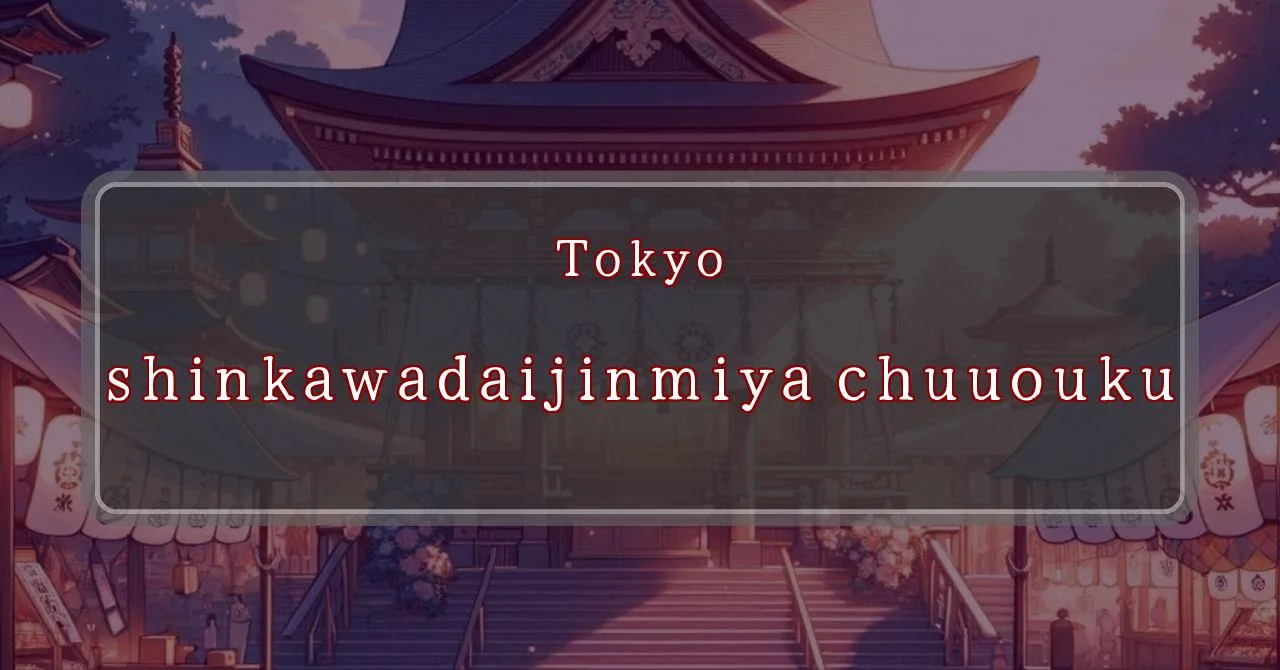Enchanting Shrine Festival in Tokyo’s Heart
Basic Information
Shinkawa Daijingu Shrine is a Shinto shrine located in Chuo Ward, Tokyo, Japan. It is dedicated to the deities Amaterasu Omikami and Toyouke Omikami, the gods of the sun and agriculture, respectively.
- Address: 1-8-17 Shinkawa, Chuo-ku, Tokyo 104-0033
- Phone Number: +81 3-3551-0551
- Access: 5-minute walk from Kayabacho Station on the Tokyo Metro Hibiya Line or Tozai Line
- Festival Days: December 27th (Wed), 2024
Main Events and Attractions of the Festival
The Shinkawa Daijingu Shrine’s annual festival is a lively and colorful event that attracts many visitors each year. The festival features a variety of events and attractions, including:
Mikoshi Procession
The highlight of the festival is the mikoshi procession, in which a portable shrine is carried through the streets of the neighborhood. The mikoshi is decorated with colorful tapestries and streamers, and it is carried by a team of men and women. The procession is accompanied by music and dancing, and it creates a festive atmosphere.
Kagura Performance
Kagura is a traditional Japanese dance that is often performed at Shinto shrines. During the festival, kagura is performed by a group of young women who wear colorful costumes. The dance is accompanied by music and singing, and it tells stories from Japanese mythology.
Food and Games
The festival also features a variety of food and games. There are stalls selling traditional Japanese food, such as yakitori, takoyaki, and okonomiyaki. There are also games for children, such as ring toss and goldfish scooping.
Fireworks Display
The festival concludes with a spectacular fireworks display. The fireworks are launched from a barge in the Sumida River, and they light up the night sky with their brilliant colors.
Blessings and Deities
Shinkawa Daijingu Shrine is dedicated to the deities Amaterasu Omikami and Toyouke Omikami. Amaterasu Omikami is the sun goddess and the most important deity in the Shinto pantheon. She is revered as the ancestor of the Japanese imperial family and is associated with light, warmth, and life. Toyouke Omikami is the goddess of agriculture and food. She is worshipped for her role in providing sustenance and nourishment to the people of Japan.
- Amaterasu Omikami: Goddess of the sun, light, warmth, and life
- Toyouke Omikami: Goddess of agriculture, food, and nourishment
Origin and History
The origins of Shinkawa Daijingu Shrine are unclear, but it is believed to have been founded in the early 17th century. The shrine was originally located on the banks of the Sumida River, but it was moved to its current location in 1659 after a fire destroyed the previous shrine.
- Founded: Early 17th century
- Original location: Banks of the Sumida River
- Current location: 1-8-17 Shinkawa, Chuo-ku, Tokyo 104-0033
Tips and Notes for Visitors
Here are some tips and notes for visitors to Shinkawa Daijingu Shrine:
- The shrine is open daily from 9:00 AM to 5:00 PM.
- Admission is free.
- The shrine is a popular destination for weddings and other ceremonies.
- There is a small museum on the shrine grounds that displays artifacts related to the shrine’s history.
- The shrine is located in a busy area of Tokyo, so it is best to visit during the off-season (November-February) to avoid crowds.
Parking Information
There is no parking lot at Shinkawa Daijingu Shrine. However, there are several public parking lots located nearby.
- Shinkawa Parking Lot: 1-10-1 Shinkawa, Chuo-ku, Tokyo 104-0033
- Kayabacho Parking Lot: 1-1-1 Kayabacho, Chuo-ku, Tokyo 104-0033
- Nihonbashi Parking Lot: 1-1-1 Nihonbashi, Chuo-ku, Tokyo 103-0027
Popular Stalls and Food Carts in Recent Years
| Type of Stall | Description |
|---|---|
| Takoyaki | A staple at Japanese festivals. Characterized by a crispy outside and a creamy inside. |
| Jaga Butter | A simple yet popular snack of hot potatoes lavishly topped with melted butter. |
| Baby Castella | Small castella cakes, sweet and fluffy treats enjoyed by children and adults alike. |
| Grilled Ayu with Salt | Fresh ayu fish grilled whole with salt, a savory taste of Japanese summer. |
| Shaapin | A unique gourmet item influenced by foreign cuisine, with a chewy skin wrapping the filling. |
| Okonomiyaki | A Japanese grilled dish where you often choose your own ingredients for a personalized flavor. |
| Cotton Candy | A fluffy, sweet snack that’s extremely popular with children. |
| Chocolate Banana | A banana coated in chocolate, a fun and visually appealing dessert. |
| Kushiyaki | Various types of ingredients skewered and grilled, an easy-to-enjoy snack. |
| Yakisoba | Fried noodles mixed with a special sauce, a fast food favorite in Japan. |



